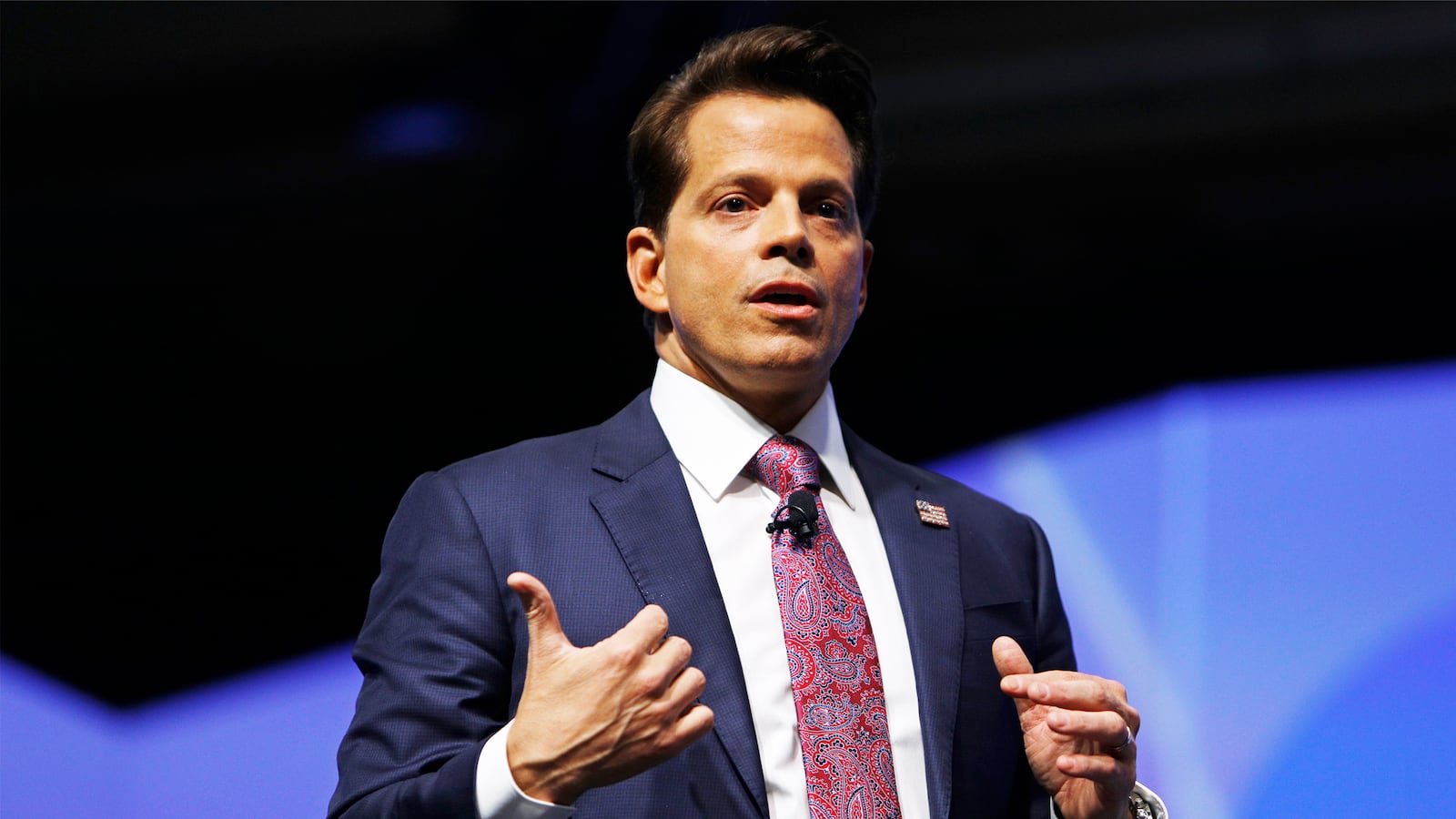LAS VEGAS—Wednesday afternoon, two thousand men in blue suits sat down to a lunch of well-done steak. Barely two bites into a frisée appetizer, a squat man appeared onstage and grabbed the microphone. It was Peter Diamandis, the founder and director of Singularity University. He’d come bearing a remarkable gift: the formula for how to prolong human life by “hundreds and hundreds of years.”
“There is no better business opportunity than extending human life,” Diamandis told the crowd, before launching into a discussion of how placenta could hold the key to eternal youth.
Not everyone was keen on listening to the benefits of harnessing stem cell research and artificial intelligence over hors d’oeuvres. “Why is he talking about this?” an investment banker groaned at a table in the back. “I don’t want to hear about placenta!”
Most people travel to Vegas to live life, not extend it or even reflect on it. That seemed to be the case for the men and a smattering of women who had flown there for the 10th anniversary of SALT, a finance industry confab of bankers and fired White House officials organized by short-lived Communications Director Anthony “The Mooch” Scaramucci. The whole event seemed to exist in an alternate universe—one that glossed over trivial realities like its host’s famous public firing, its panelists’ myriad controversies, and the inexorable march toward death.
In the past, SALT has drawn big names on both political and cultural planes, counting Joe Biden, George W. Bush, Bill Clinton, as well as Al Pacino, Kobe Bryant and will.i.am among its guests. One night over drinks, a 10-year SALT veteran whose chest hair burst from his Hawaiian shirt, boasted it had been “the greatest hedge fund conference in the country.”
But the line-up this year reflected the degree to which Donald Trump has become the center of the cultural solar system, around which everything and everyone else orbits. Instead of titans of finance and bigwigs of industry, the conference was dominated by former Trump officials—fired and resigned: #MAGA hangers-on like TPUSA founder Charlie Kirk and almost-Federal Reserve Board appointee Stephen Moore; and an assortment of other miscellaneous politicos, like former Republican National Committee Chairman Michael Steele and Democratic presidential contender Rep. Tulsi Gabbard (D-HI). The whole thing was MC’d, of course, by the archetypal ex-Trump official: The Mooch.
“It’s like a White House reunion,” said Kunal Sood, the founder and chairman of NOVUS, a U.N. conference he described as “TED meets the U.N.”
The three day MoochFest took place at the Bellagio Hotel, a sprawling, gilded complex on the strip, whose famous fountain bounces in sync with music ranging from show tunes to Tiësto. It’s a fitting venue for an event—part networking platform, part press gaggle—that embraced cartoonish signifiers of wealth and stale pop culture references, even down to the musical guest: John Fogerty of Creedence Clearwater Revival. In the mornings, attendees in head-to-toe Brooks Brothers shuffled between half-attended panels with names like “REVISITING THE 60/40 MINDSET IN A MULTI-ASSET WORLD.” Others picked at the spread of pastries or checked email by the pool, declining to trade their Brooks Brothers suits for the bathing variety. In the evening, guests munched on hamburgers at a BBQ called “An All American Affair.”
For Scaramucci, it must have felt like something approximating a resurrection. Less than two years ago, he was fired from his White House role—a position he had held for all of 10 days (he insists 11 days)—after telling a New Yorker reporter, among other things, that he wasn’t “trying to suck my own cock.” But at SALT, it may as well have been a decade since then. Here, national humiliations had been shrunk to the scale of a small joke—one the panelists were in on.
At SALT, Mooch was the maître d', not the poster child of public disembowelment (his wife filed for divorce during his White House ordeal while nine months pregnant with their child; they later reconciled). Moore was a respected economist, not a failed Fed nominee fresh from a tirade calling his critics “stupid and evil.” Christie was a tough-talking former governor, not a neutered Trump cast-off, and Sessions was an elder statesman pondering his next move. “I haven’t decided about the Senate race,” Sessions told the Wednesday crowd, grinning.
Moore—a man who had recently called for a “statute of limitations on saying stupid things,” after losing his nomination to the Federal Reserve Board over his past writings about women, among other things—even found time in his 15-minute panel to make a racist joke. America, he quipped, would economically crush China because, “our Chinese are smarter than their Chinese.” No one laughed.
In this safe space, billionaire Sam Zell was a real estate mogul, not the the financier who left Tribune—once the parent company of two of the country’s most important papers—billions of dollars in debt. And David Bossie, president of Citizens United, appeared on a panel about the “Future of the GOP”—just days after he publicly fell out of favor with the president over the revelation that he had grifted more than $16 million from Trump supporters under the guise of fundraising for his re-election campaign.
There were moments of clarity, though they were hardly well-received. In the opening panel, Lady Lynn Forester de Rothschild, a philanthropic heiress, paid lip service to the ongoing conversation around income inequality. She cited recent statements from Disney heiress Abigail Disney, who questioned the pay packages of CEOs like Bob Iger, which amount to as much as 1,424 times the median pay of their average employee.
“A world where the wealthiest 1 percent of Americans hold 40 percent of the country’s wealth,” Rothschild told a crowded room, “is unsustainable.” The line got no applause. Onlookers, who had paid $6,600 to be there, hastily checked their phones. Every stray bite of melon ball seemed cacophonous.
When Housing and Urban Development Secretary Ben Carson took the same stage the following day and announced that America “is probably the last place where we should be having this class warfare argument,” the room erupted in cheers. His biggest laugh line came when he parroted European criticisms of American capitalism, calling equitable wealth distribution “a load of crap.”
“You think about early on when all the Europeans complained about America,” Carson said. “They said, ‘You’ve got all these rich people like the Vanderbilts, and the Rockefellers… and then you have all these poor people. You can’t run a government like that. You have to have an overarching government that receives all the funding and then equitably redistributes it.’ You ever heard that? What a load of crap.”
Carson, of course, runs an agency that redistributes funding to poor people in need of housing. But it was unclear if he counted himself in with the crap. Like the rest of the panels, Carson’s was one where language and meaning were often unmoored from reality, where low-income neighborhoods were rebranded “opportunity zones” and proper nouns became acronyms; where politicians trotted out catchy bromides and finance bros reveled in not having to explain themselves to laymen. At SALT, you could learn how to escape death. Or you could attend talks on “Multi-Strategy Asset Allocation in a Fragmented World,” and “Investing With A Catalyst: Special Situations and Event Driven Opportunities.” Either way, none of it seemed actually real.
“It’s like they’re talking in code,” an attendee named Chris, who works in money management, said. “I’m knee-deep in this, and still sometimes I’m just like, you’re making this up.”






